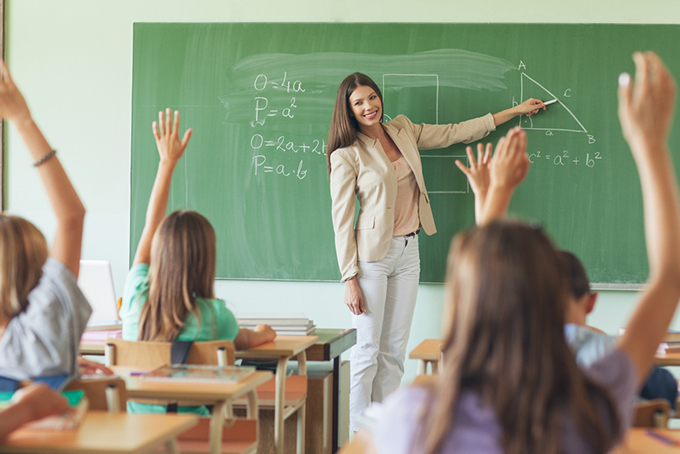
France, last of the class in maths? Published in December 2020, the latest results of the TIMSS survey are cause for concern for parents and teachers. Indeed, in mathematics, France is in last place at European level and among the very last at OECD level. How to explain such a poor performance?
TIMSS is an international program to assess the performance of fourth-grade and fourth-grade students in mathematics and science. France’s participation in this program, which has taken place every 4 years since 1995, is modest (it participated four times, in 2015 and in 2019 for CM1 students; in 1995 and in 2019 for students of 4 e ). The objective is to produce a database making it possible to position national educational choices in mathematics and science in relation to established standards, in order to promote international comparisons.
The statistical data used to identify at least three essential factors that influence student performance: content, organization and progress of programs, student attitudes toward mathematics and teacher training.
All of the mathematical content on which the fourth grade students assessed is spread over four areas: numbers (30% of the assessment), algebra (30%), geometry (20%) and data analysis (20 %). These contents were not all seen by the French pupils: 54% of the pupils of the fourth received lessons relating to the whole of the contents; this is the case for around 80% of CM1 students in the sample.
It emerges from TIMMS France that in reasoning, the pupils of the fourth are more effective than in application of mathematics, and restitution of knowledge; for primary school students, it is the other way around. That said, the choice of programs and their progression in mathematics can in no way justify, on their own, these poor pupil performances.
Statistical data from TIMSS also shows that the more students enjoy math, the better they perform on assessments. But only half of CM1 students say they really like mathematics and this proportion drops sharply in fourth (11%). Unsurprisingly, these same data also emphasize the positive link between students’ valuation of mathematics and their performance. This confirms data from developmental psychology establishing the correlation between pleasure in learning and success in learning.
Teachers: training issues
With regard to teacher training, both in CM1 and in fourth, more than 60% of students were paid by teachers who expressed the need for additional training allowing individual support for students, development of their critical thinking and problem-solving skills as well as the integration of technological tools into the various phases of teaching.
The need for professional development felt by teachers engages the responsibility of decision-makers and educational actors to put in place support systems up to the challenges of teacher training and that of their students.
From a constructivist perspective, we change when we have the possibility of realizing the contradictions between what we want to do, what we are doing it for, what we think we are doing and ultimately what we are doing. Our hypothesis is that it is these contradictions perceived by teachers that motivate their expressed need for training. Providing all students with the pleasure of doing mathematics is particularly emblematic of this gap between their will and their reality.
It is clear that the ranking of France in TIMSS is quite striking, it is difficult to imagine France almost in the last rank of nations in mathematics education. But this awareness of these results and of the link with teacher training must be a historic opportunity to change and transform this reality. It is therefore essential to put in place a strategy that is guided by the ambition to give everyone, teacher and student, the real possibility of training in order to be able to think, work and participate in the world of today and tomorrow.
Give back a taste for math
Making mathematics love and practicing it with pleasure clearly constitutes a promising avenue for this challenge. The Villani-Torossian report mentions for the first time, extensively (22 times) this dimension of mathematics. We could hope that this shift bears fruit. However, in this report, practically no classroom teaching device is highlighted to achieve concrete translation of this recommendation. And, despite all the teachers’ wishes, putting the pleasure of doing mathematics at the heart of the pupil’s activity is not so natural.
The essence of mathematics intrinsically includes this dimension of pleasure through the discovery not only of a new world but also of one’s own capacities to understand this world. In addition, most teachers have not experienced such devices themselves during their schooling. The stake is then that of helping them to become aware of it and to conceive them. This calls for collaboration between researchers, inspectors and teachers in a climate of trust and dialogue.
Beyond the teachers’ original stream (who may initially come from very varied areas of training with regard to teachers of CM1 students), it is imperative to give all teachers the opportunity to stop and reflect on the transmission of science in a device provided for this purpose. This opportunity can be seized in the preparation of the thesis in the training of all teachers. On this occasion, joint observation between peers can then have the desired effects.
However, it appears that efficient observation tools are not sufficiently available for this collaboration. The process of reflexivity requires both tools for observation and tools to translate these observations into questions, that is to say the skills of a researcher, before it can be registered in a relevant action. It is therefore a question of thinking of a collaboration between teachers, researchers and inspectors in an efficient sharing of skills to design these tools. This is what remains to be imagined and implemented.
Author Bios: Line Numa-Bocage is Professor of Education Science University, Psychologist at CY Cergy Paris University, Imene Ghedamsi-Lecorre is Professor at the University of Tunis El Manar and Thomas lecorre is a Lecturer, BONHEURS laboratory also at CY Cergy Paris University
